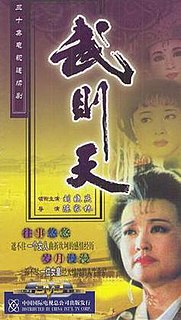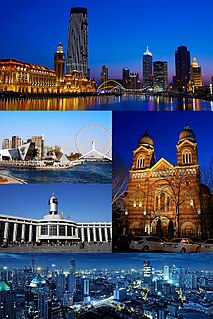Randi is both a given name, and a nickname in the English language, popular in North America and Norway. It is primarily a feminine name, although there is recorded usage of the name by men. It may have originated as a pet form of Miranda or as a feminine form of Randy. In turn, Randy was originally derived from the names Randall, Randolf, Randolph, Bertrand and Andrew.
The politics of Hebei Province in the People's Republic of China is structured in a dual party-government system like all other governing institutions in mainland China.
Wang Gang is a retired Chinese politician. He served in prominent leadership positions in the Communist Party of China after 1999, including Director of the General Office of the Communist Party of China and Secretary of the Secretariat. He was a member of the Politburo from 2007 to 2012.
Wang Chen is a Chinese journalist and politician. He served as Director of State Council Information Office from 2008 to 2013, and currently serves as the Secretary-General of the 12th National People's Congress Standing Committee.

Three Kingdoms is a 2010 Chinese television series based on the events in the late Eastern Han dynasty and the Three Kingdoms period. The plot is adapted from the 14th century historical novel Romance of the Three Kingdoms and other stories about the Three Kingdoms period. Directed by Gao Xixi, the series had a budget of over 160 million RMB and took five years of pre-production work. Shooting of the series commenced in October 2008, and it was released in China in May 2010.
Wang Xudong is a politician of the People's Republic of China. He formerly served as Minister of Information Industry, chairman of the State Electricity Regulatory Commission (SERC), and the Communist Party Chief of Hebei province.
Wang Bingqian is a politician of the People's Republic of China and a former Minister of Finance of China.
Xiaoming Wang is a noted vertebrate paleontologist and geologist born in People's Republic of China and now living and teaching in the United States.

Wu Zetian is a Chinese television series based on the life of Wu Zetian, the only woman in Chinese history to assume the title of Empress Regnant and became the de facto ruler of China in the late seventh century. Directed by Chen Jialin, the series starred Liu Xiaoqing as the title character. It was first broadcast on CCTV in China in 1995 and subsequently aired by television stations in other countries.
Li Xudong is a Chinese football player who currently plays for China League Two side Zhejiang Yiteng.
Wang Maoshe is a former Chinese politician who served as the Communist Party Secretary of Yuncheng, a city in Shanxi province, between 2013 and 2014, and prior to that, party chief of Shuozhou. He was investigated for corruption and was expelled from the Communist Party of China in 2015.
Wang Feng original surname Wang, was a People's Republic of China politician, born in Shaanxi Province. He was Communist Party of China Committee Secretary of Gansu, twice Communist Party of China Committee Secretary of Ningxia and Communist Party of China Committee Secretary and Chairmen of Xinjiang (1978).

Wang Shoudao, original name Wang Fanglin was a People's Republic of China politician. He was born in Liuyang, Hunan Province. He joined the Communist Party of China in 1925. He was governor of his home province. He was minister of transport (1958–1964). He was CPPCC Committee Chairman of Guangdong.
The following lists events that happened during 2019 in China.

Shan Jixiang is a Chinese politician and architect who served as curator of the Palace Museum between 2012 and 2019. He formerly served as Director of the National Cultural Heritage Administration.
Wang Xudong is the Director of the Palace Museum since 8 April 2019. Previously he served as director of Dunhuang Research Academy. He is an alternate member of the 19th Central Committee of the Communist Party of China.








